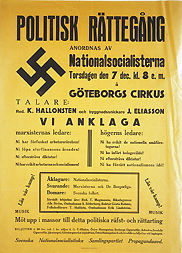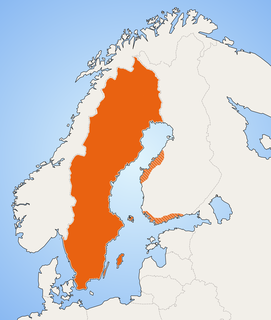
Skåne County, sometimes referred to as Scania County in English, is the southernmost county or län, of Sweden, basically corresponding to the traditional province Skåne. It borders the counties of Halland, Kronoberg and Blekinge and connected to Capital Region, Denmark by the Oresund Bridge. The seat of residence for the Skåne Governor is the city of Malmö. The headquarters of Skåne Regional Council is the town of Kristianstad.

The Moderate Party is a liberal-conservative political party in Sweden. The party generally supports tax cuts, the free market, civil liberties and economic liberalism. Internationally, it is a full member of the International Democrat Union and European People's Party.

The Communist Party of Great Britain is a political group which publishes the Weekly Worker newspaper. The CPGB (PCC) claims to have "an internationalist duty to uphold the principle, 'One state, one party'. To the extent that the European Union becomes a state then that necessitates EU-wide trade unions and a Communist Party of the EU". In addition, it is in favour of the unification of the entire working class under a new Communist International. It is not to be confused with the former Communist Party of Great Britain, the Communist Party of Great Britain (Marxist–Leninist), or the current Communist Party of Britain.
National Socialist Party or Nazi Party may refer to:

The Parti National Social Chrétien was a Canadian political party formed by Adrien Arcand in February 1934. The party identified with antisemitism, and German leader Adolf Hitler's Nazism. The party was later known, in English, as the Canadian National Socialist Unity Party or National Unity Party.
The Socialist Unity Party was one of the better-known communist parties in New Zealand. It had a certain amount of influence in the trade union movement, but never won seats in Parliament.

National Socialist Bloc was a Swedish national socialist political party formed in the end of 1933 by the merger of Nationalsocialistiska Samlingspartiet, Nationalsocialistiska Förbundet and local National Socialist units connected to the advocate Sven Hallström in Umeå. Later Svensk Nationalsocialistisk Samling merged into NSB.

The Left Socialist Party - Socialist Party of Struggle is a Belgian Trotskyist party, affiliated to the Committee for a Workers' International. The party publishes monthly newspapers in Dutch and French, entitled Linkse Socialist and Lutte Socialiste, respectively.
The World Union of National Socialists (WUNS) is an organisation founded in 1962 as an umbrella group for neo-Nazi organisations across the globe.

Nationalsocialistiska Arbetarpartiet was a Swedish political party which initially espoused Nazism before adopting a more indigenous form of fascism.
National Socialism most often refers to Nazism, the ideology of the Nazi Party which existed in Germany between 1920 and 1945 and ruled the country from 1933 to 1945. The term "National Socialism" was used by a number of unrelated groups before the Nazis, but since their rise to prominence it has become associated almost exclusively with their ideas.
The Communist Unity Group (CUG) was a small communist organisation in the United Kingdom.
Nasisten was a National Socialist weekly newspaper published in Malmö, Sweden, between September 1933 and April 1934.

The Swedish National Socialist Party was a National Socialist political party in Sweden. Birger Furugård served as riksledare of the party.

The Swedish National Socialist Unity Party was a National Socialist political party in Sweden. The party was born out of a split in the Swedish National Socialist Party in October 1933, as the Göteborg-based Party Staff (partistaben) of SNSP declared the party leader Birger Furugård expelled from the party. Furugård was however able to isolate the Party Staff faction, and retained a majority of the party membership. The Party Staff regrouped as the Swedish National Socialist Unity Party. The Party Staff group continued to publish Vår Kamp as its party organ.
The Socialist Alliance was a left-wing electoral alliance in England between 1992 and 2005.

The Left Party is a socialist political party in Sweden. The party originated as a split from the Swedish Social Democratic Party in 1917, as the Swedish Social Democratic Left Party, and became the Communist Party of Sweden in 1921. In 1967, the party was renamed Left Party - the Communists; it adopted its current name in 1990. The party has never been part of a government at the national level.
Socialist Resistance (SR) is an ecosocialist, feminist and revolutionary organisation in Britain, which publishes a Marxist periodical of the same name. In July 2009 the International Socialist Group (ISG) merged into it, making SR the British Section of the Fourth International.










